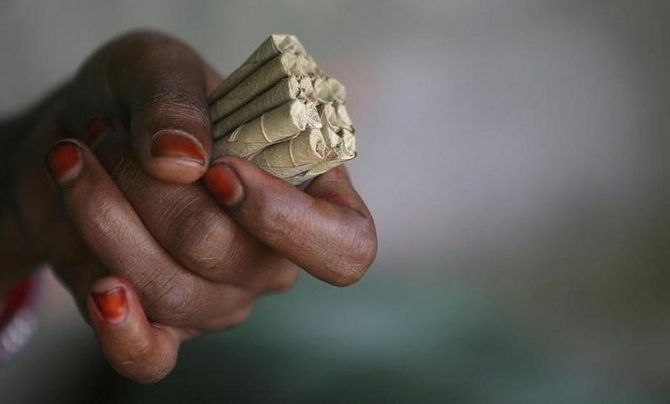The proposed amendment to the Cigarettes and Other Tobacco Products Act puts the livelihooNewd of millions of women in jeopardy, according to a study.

The new insertion (Section 10A(3)) makes it mandatory for persons to obtain licences, permissions and registrations for manufacturing, selling and distributing any tobacco product, it said.
"This insertion if implemented will be an extremely harsh measure for small vendors who do not have the competency or financial means to obtain such licence," said the study by human rights lawyer Vibha Vasuki and senior professor of anthropology Siva Prasad Rambhatla.
Tobacco products are mostly sold by small vendors and hawkers who have a small scale set up for selling tobacco products, it was noted.
Most of the sale of beedis take place from micro shops situated under trees and on pavements which will not be recognised by the municipalities or given licenses, according to the authors of the study titled -"A Study on the Status of Alternate Employment Schemes for Women Beedi Rollers."
"Therefore, the entire sale of beedis will come to a grinding and abrupt halt.
"If the sale of beedis comes to a halt, then the entire beedi industry will come to a halt," they said.
The study delves into the impact this COTPA amendment will have on millions of women beedi rollers in the country.
The report said that until skill-building and alternative employment is provided on a large scale for their livelihood, Beedi rolling is the only viable occupation for millions of women across India.
The study states that beedis (thin, hand-rolled cigarettes that are wrapped in a tendu leaf and filled with tobacco) dominate tobacco consumption in India.
About 7.7 per cent of adults in India smoke beedis which have a market share of 85 per cent of all smoking products in India, it claimed, adding, any anti-tobacco legislation largely impacts the beedi industry.
The manufacturing process is highly labour intensive, the study pointed out.
The over hundred-year-old cottage industry employs workers in mostly the unorganised sector comprising mainly of home-based women workers from poor households.
Ninety-six per cent of the total beedi workers are home-based while only four per cent work in factories.
A majority (84 per cent) of home-based workers are women while only 16 per cent are men, according to the study.
As a member nation signatory to the WHO Framework Convention on Tobacco Control (FCTC), the Government of India is obligated to promote and provide suitable alternative livelihoods for tobacco workers, including beedi rollers, it stressed.
Beedi workers, the study said, are among the most marginalised communities in India, adding, until skill-building and alternative employment is provided on a large scale for their livelihood, beedi rolling is the only viable occupation for millions of women across India.
"If the COTPA Amendment Bill 2020 is brought into effect, it will severely impact the livelihood of millions of Beedi workers in India," it said.
Photograph: Rupak De Chowdhuri/Reuters











 © 2025
© 2025